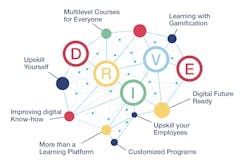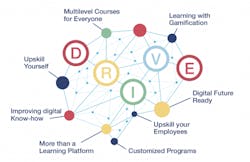Digital transformation requires more than putting in new digital equipment, connecting it to the cloud and providing web-based dashboards for everyone to monitor and analyze operations remotely. (If only it were that simple!)
True transformation, the kind of IIoT/4.0 digital transformation that digital technologists are promising through the smart-factory concept, comes from a fundamental change in the way that workers, managers and executives think about optimizing their operations. These changes include a change in vocabulary, establishing data transparency and rethinking how work gets done.The need to change
Recognizing the “cultural” change that has to occur is the first big step for most companies, which may have spent decades investing in processes, systems and workflows that currently get the job done. To accomplish the culture change required for a truly smart factory, there must be a means of capturing, learning, practicing and teaching the value of the new digital technologies and the ways the technologies are applied in day-to-day operations across all functions of the business. Additionally, the skills required for all jobs are changing as jobs are changing.
In this way, digital transformation can be justified by its impact on employees’ roles and changing job requirements (upskilling). In order to accomplish personalization and real-time learning, a platform is needed to accelerate knowledge as fast as digital 4.0 technologies are changing the landscape of work. Fundamental capabilities of such a transformation platform should provide for curation of content to be made available in all languages to get all employees up to speed on the core vocabulary and applications of all relevant digital technology concepts. The platform should also make the learning accessible as quickly and easily as employees can make time to learn the needed and relevant concepts.
Additionally, the ideal platform would allow for advanced practice/simulation, dialogue with peers in similar roles, provide access to learning paths to confidently pursue topics important to their career objectives, deliver the ability to capture and share their own knowledge, and even offer functionality to centralize existing learning content so that everything can be found and shared from a common library view. Additionally, it should integrate with any LMS that is already in place in the organization.
Solutions that DRIVE employee knowledge
DRIVE was researched and implemented with the consulting insights of Fraunhofer Research Institute and is being used as a platform for teaching 4.0 concepts while enabling the transfer of knowledge from retiring experts to new recruits “on the fly” as they adapt to new work styles, new expectations and new job requirements. DRIVE is also helping existing employees pick up new skills in real time as their jobs are changing…real-time adaptive learning.
Here’s how it works: An expert with years of experience captures an important “lesson” on operating critical equipment via their camera, smart phone or augmented-reality glasses. The expert tags the video to the equipment (asset), enabling a new worker to learn from the expert, even if the expert has left the organization. The new worker can further add to the content with their own insights. These lessons and learnings can be accessed by workers to enhance their skills, transition into new job roles, or adapt to new expectations as they get promoted.
Upskilling throughout the organization in real time
Consider also that the original expert’s lessons can be immediately shared across the whole organization. By associating lessons via metatags to equipment assets, common equipment can share the same lessons with the full range of job roles that interact with the asset(s); knowledge is made accessible to everyone everywhere who might benefit from the teachings. As a result, the entire organization is uplifted and upskilled by flattening the learning process and democratizing access to content when and where it is needed.
Culture shifts slowly, but with transformation platforms like DRIVE, expect that those willing to move quickly and voluntarily will create the kind of vacuum that draws their peers and ultimately the business across the knowledge gap. The ultimate value of an educational platform like this is the complete ecosystem of hosting, evolving and sustaining the types of dialogues and knowledge-transfer necessary to move company cultures to 4.0 and beyond.
Brent Ward is the global digitalization business-development manager at Voith Digital Ventures

